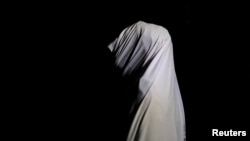The Nigerian military welcomed a report by a human rights group that found “no evidence” the military secretly carried out thousands of illegal abortions as part of its fight against Islamist insurgency. The Reuters news agency says it stands by its three reports in 2022 which lodged the allegations.
In a statement over the weekend, Nigerian Defense Chief General Christopher Musa praised the report by the seven-member investigative panel set up by the National Human Rights Commission of Nigeria.
Musa said no amount of false accusations will distract the armed forces from defending Nigeria's integrity.
On Friday, the Nigerian investigative panel said it found “no evidence” that the Nigerian military secretly carried out illegal abortions or had such a policy in its operations against terror groups.
The panel's probe lasted 18 months and was based on 199 testimonies from witnesses including Musa, who was leading the counterinsurgency campaign at the time.
In December 2022, Reuters news agency published three reports alleging that the Nigerian military ran a mass abortion program for victims of the long-running Boko Haram insurgency and massacred children in the northeast.
The report alleged that the military had carried out more than 10,000 abortions since 2013.
"The panel made its findings meticulously on each of the issues," said Hillary Ogbonna, secretary to the investigative panel. "For the abortion assault, the panel did not find evidence that the Nigerian armed forces committed a systematic, secret or policy-driven abortion in the northeast to the tune of 10,000 abortions."
The committee, however, agreed with a Reuters report alleging the military committed human rights violations, including infanticide, during a military operation in June 2016.
"The panel found the military culpable of infanticide and the killing of community members in the village of Abisare in Borno State. We've received witness testimonies including those of the survivors and relations of the deceased," Ogbonna said.
Responding to the panel's report, Reuters said it stands by its investigation, stating that it satisfied their standards for independence, accuracy and impartiality.
On Monday, a Nigerian human rights group, Women Concerns, called on Reuters to withdraw the report and apologize to the Nigerian military.
But security analyst Chidi Omeje said when there's disagreement between two parties, an independent committee can be set up to review the reports.
"I don't know how the human rights commission went about the investigation. I really cannot say whether it was a thorough job done or whether there was some influence somewhere. Maybe some other independent organizations should be able to wade in," Omeje said. "I know that [the] human rights commission, even though I'm not trying to doubt their integrity, it has some allegiance to the government because it's a government agency."
Years of military offensives against terror groups in Nigeria have been embroiled in allegations of human rights violations. Soldiers have been accused of mistreating civilians and carrying out extrajudicial killings.
"It tells you how it is very difficult to maintain or stick to that professionalism if you're dealing with this kind of asymmetric warfare. Sometimes it is difficult to distinguish who the adversaries are," Omeje said.
Recently, the military launched a public relations campaign, seeking to repair its reputation.




